#solidarity for writers
Explore tagged Tumblr posts
Text
LIAFF SPECIAL #6: Sciopero WGA 2023 - Paralisi a Hollywood

Carissimi lettori, ben ritrovati con un nuovo appuntamento con LIAFF SPECIAL, la rubrica dedicata all’approfondimento di personaggi e temi nel mondo dell’intrattenimento. L’argomento per questo mese non poteva che essere il recente sciopero della Writers Guild of America, iniziato il 02 Maggio 2023 e tutt’ora in corso, una situazione molto complessa e ricca di dinamiche, purtroppo ignorate dalla maggioranza delle persone. In questo articolo approfondiremo la questione, parlando dei precedenti scioperi, delle motivazioni che hanno portato alla sospensione delle attività da parte degli sceneggiatori iscritti all’associazione e delle relative conseguenze in merito alle prossime uscite cinematografiche e televisive, nella speranza che si possa far chiarezza su quanto sta accadendo in questi giorni a Hollywood.

Previously on...: i precedenti
Da quando è stata fondata nel 1933, la Writers Guild of America (WGA) ha scioperato cinque volte, esclusa quella attuale, e ogni volta le motivazioni erano sempre differenti, ma in qualche maniera legati ai diritti degli sceneggiatori e ai compensi per i loro prodotti:
Il primo sciopero fu nel 1960, iniziato il 16 Gennaio e concluso il 12 Giugno di quell’anno, per un totale di 148 giorni, dove fu raggiunto un accordo che migliorava i diritti e le pensioni degli sceneggiatori, con un incentivo di guadagno per tutti i film andati in onda prima del ‘60.
Il secondo fu nel 1981, durato per 13 settimane, il cui accordo finale stabiliva dei compensi per i prodotti delle tv a pagamento e del mercato home-video.
Il terzo fu nel 1985 e durò solo per due settimane, il più breve sciopero della storia dell’associazione, con un accordo che migliorava i pagamenti residuali per l’home-video.
Il quarto fu nel 1988 e durò esattamente 153 giorni, rendendolo lo sciopero più lungo della storia dell’associazione, con un contratto che migliorò i residuali per le repliche delle serie con episodi di circa un ora.
Il quinto fu a cavallo fra il 2007 e il 2008, con una durata di poco più di tre mesi, con una disputa in merito ai compensi per le uscite in DVD. Tale sciopero viene purtroppo ricordato per il numero di serie che furono intaccate, le quali andarono in onda con stagioni più corte o furono addirittura posticipate alla successiva stagione televisiva.

Why it happened?: perchè la WGA ha scioperato?
Lo sciopero iniziato il 02 Maggio 2023 è stato indetto dall’associazione a causa della mancanza di un accordo con l’Alliance of Motion Picture and Television Producers (AMPTP) che regolarizzava il compenso per le serie in streaming, il quale ha visto una diminuzione negli ultimi dieci anni, come anche l’uso dell’intelligenza artificiale (AI), che sta tutt’ora spopolando in numerosi ambiti, come strumento per facilitare la ricerca di idee per la stesura piuttosto che come rimpiazzo totale degli sceneggiatori, l'ampliamento delle “writers' rooms” per dare spazio a più co-sceneggiatori nella stesura dei vari episodi e una maggiore sicurezza lavorativa. Consecutivamente il 01 Maggio il Minimum Base Agreement (MBA), l'accordo che copriva i compensi per tutti gli associati, era scaduto, il quale però si applicava solo a serie TV trasmesse su canali broadcast e non sulle piattaforme streaming, portando gli sceneggiatori di tali produzioni a venire pagati di meno. La WGA aveva stimato che venire incontro alle loro richieste comportava agli studios un costo di 429 millioni di dollari all'anno, ma l'offerta dell'AMPTP ammontava solo a 86 millioni di dollari. Già a partire dal 18 Aprile, circa il 98% dei membri dell'associazione aveva votato a favore di uno sciopero in caso di un mancato accordo per il 01 Maggio, cosa che è purtroppo accaduta. Durante lo sciopero, la WGA ha espressamente chiesto ai suoi membri di non compiere alcuna attività di scrittura, revisione e discussione di progetti futuri, così come ogni mansione legata alla produzione, nonostante gli studios stiano scrivendo lettere ai vari showrunner invitandoli a procedere con le attività di produzione non legate alla scrittura. A partire dal 02 Maggio la WGA ha istruito i suoi membri a manifestare nelle principali sedi degli studios, con vere e proprie proteste a cui stanno prendendo parte i sceneggiatori dell’associazione, come numerosi interpreti e anche autori, come George R.R. Martin e Neil Gaiman, per non parlare dei numerosi post di solidarietà sui social da parte di note celebrità e di persone comuni. Per far fronte ai problemi finanziari legati allo sciopero la WGA ha messo insieme un fondo di circa 2 millioni di dollari per coprire le spese sanitarie e non solo, a cui hanno contribuito numerosi showrunners e produttori.

#PayYourWriters: le conseguenze per il futuro
Ovviamente la domanda che vi sarete chiedendo è cosa comporta questo sciopero per noi telespettatori. Al momento gli studios hanno già piazzato alcuni titoli per l'estate e forse anche per l'inizio dell'autunno, ma, qualora lo sciopero dovesse persistere fino a quel periodo, le cose potrebbero farsi più complicate. Diverse serie in pre-produzione, fra cui alcune che avevano già iniziato le riprese, sono state messe in pausa fino alla fine dello sciopero, comportando un inevitabile ritardo per il loro rilascio; altre serie, soprattutto quelle di ABC, avranno la premiere in midseason, con la possibilità di una stagione più corta del previsto; altre produzioni, come ad esempio Deadpool 3, le seconde stagioni di House of the Dragon e The Lord of the Rings: The Rings of Power, e la serie prequel di IT Welcome to Derry, continuano la loro produzione, sebbene siano forte oggetto di critica per il fatto che non possono fare revisioni qualora vi siano problemi nella sceneggiatura (in particolare per il film Marvel con protagonista Ryan Reynolds, quest’ultimo non potrà improvvisare e dovrà attenersi alla sceneggiatura, da lui co-scritta); i talk show sono andati in pausa, non avendo materiale da mandare in onda; anche diversi film sono andati in pausa, fra cui i film Marvel Blade e Thunderbolts. Da questo scenario sorge un’altra importante domanda: come faranno gli studios ad andare avanti? Sulla carta, Netflix è l’unica piattaforma che potrebbe colmare il vuoto, in quanto vede una buona fetta del suo palinsesto caratterizzata da produzioni internazionali, da cui ha già ottenuto numerosi guadagni (basti pensare al fenomeno Squid Game), e stando all’atteggiamento mostrato dai suoi esecutivi riguardo allo sciopero e alle voci che affermano che l’accordo fra WGA e AMPTP non è stato raggiunto proprio a causa del colosso streaming in rosso, viene da pensare che il problema siano proprio Ted Sarandos e soci. Tutti gli altri dovranno fare i conti con la mancanza di programmi da mandare in onda e, citando un recente articolo di Vanity Fair, potremmo essere condannati a un mondo di reality, notizie e sport per diverso tempo, il che non è positivo. Con la quinta settimana di sciopero ormai alle porte e senza alcuno spiraglio di risoluzione del problema, per non parlare del possibile sciopero del Screen Actors Guild-American Federation of Television and Radio Artists (SAG-AFTRA) e del Directors Guild of America (DGA), i quali vedono i loro contratti vicini alla scadenza, il futuro dell’intrattenimento per i prossimi mesi rimane incerto, quindi non ci resta che dare sostegno ai sceneggiatori, senza i quali le storie che tanto amiamo non esisterebbero, e sperare che la WGA e l’AMPTP possano raggiungere un accordo che possa soddisfare entrambe le parti e che soprattutto onori il faticoso lavoro dello scrivere una storia, così da poter tornare ad attendere e a godere delle serie e dei film che tanto ci piacciono.
Seguiteci su Facebook (gruppo), Twitter e Instagram!
3 notes
·
View notes
Text
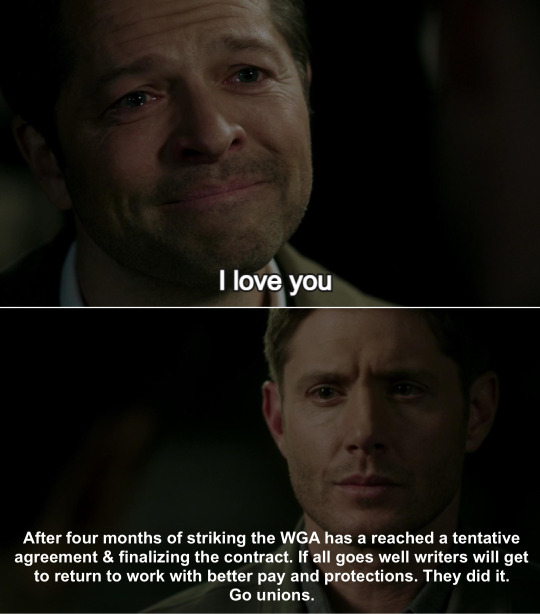
I’m so happy for them
[Image Description: Castiel from Supernatural is saying I love you, underneath is an image of Dean Winchester with the caption: “After four months of striking the WGA has a reached a tentative agreement & finalizing the contract. If all goes well writers will get to return to work with better pay and protections. They did it. Go unions”]
(Source)
#wga solidarity#wga strong#after months of watching union busting and anti union tactics#wga is coming out strong#hopefully sag is next!#writers strike#support unions#wga strike#sag strike#supernatural meme#destiel#destiel meme#workers rights#fuck the amptp#destiel news#mine#we’ve hit the note amount where people start fighting in the notes#stop fighting kids#but also the strike was absolutely necessary#withholding labor is how unions negotiate for better rights#the CEOs are multimillionaires who refused to pay proper wages#they needed to receive heavy losses so they’d actually come to the table listen to union demands
74K notes
·
View notes
Text
Possibly the greatest NPR exchange ever recorded
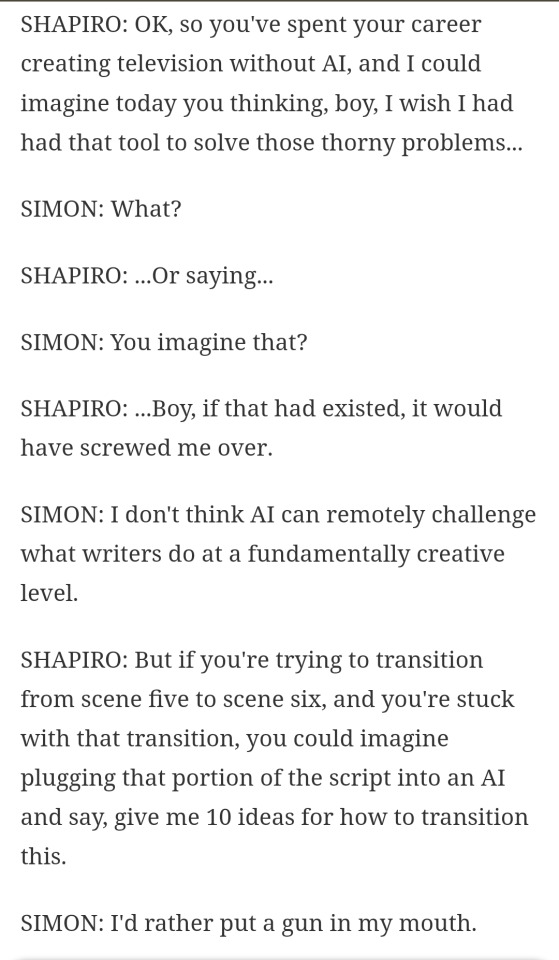
#npr news#ai#support the wga#wga strike#writers strike#anti ai writing#david simon#wga solidarity#he said that#the wire#ari shapiro
100K notes
·
View notes
Text
I love this so much
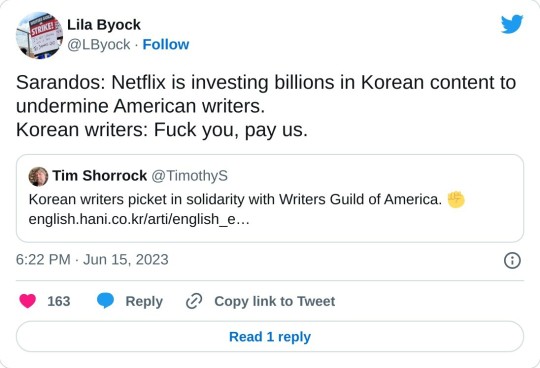

[Image IDs: the first tweet is from Lila Byock (@/Lbyock) from June 15th, 2023 and it reads:
Sarandos: Netflix is investing billions in Korean content to undermine American writers.
Korean writers: Fuck you, pay us.
That first tweet quote tweets the second image, a tweet from Tim Shorrock (@/TimothyS) from June 15th, 2023 that reads:
Korean writers picket in solidarity with Writers Guild of America. ✊
That tweet has a link to an article that I posted after it. /End ID.]
So, for those of you unaware: The Korean entertainment industry is an absolute nightmare. Actors have gone years never being paid for work they're owed pay on. The idol industry is terrible in all the ways. And it's honestly no surprise the industry is shit for writers as well. Glad to see the Korean writers are standing up for themselves too!
Edit: Not that anyone will see this because the post is too big now, but many writer organizations in countries around the world also participated in striking on June 14th, 2023.
40K notes
·
View notes
Text
26 September: thread by WGA member David Slack
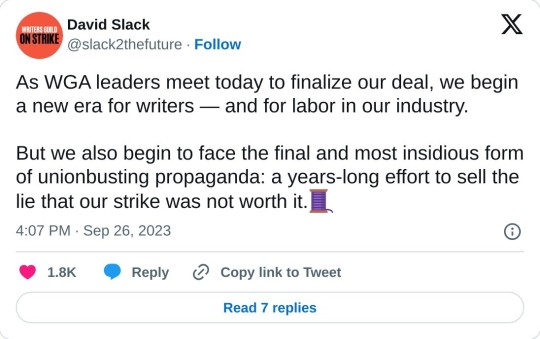
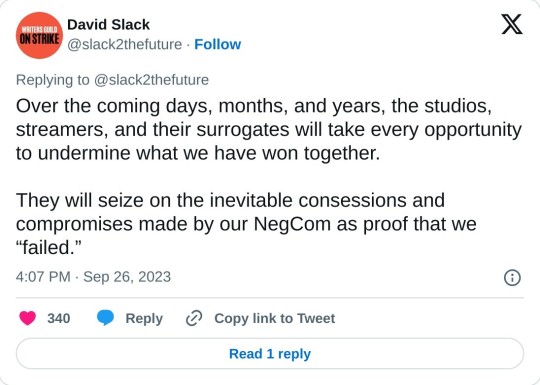
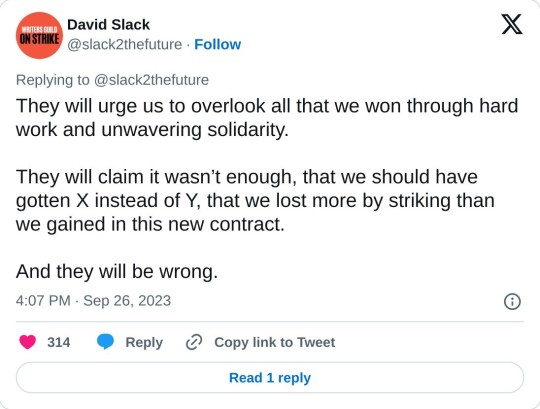
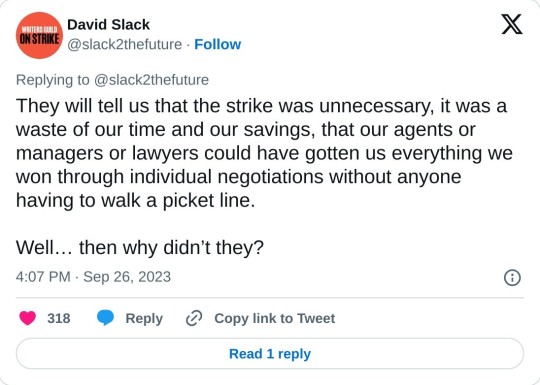
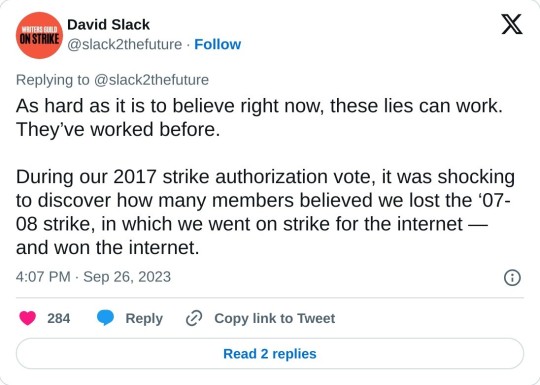
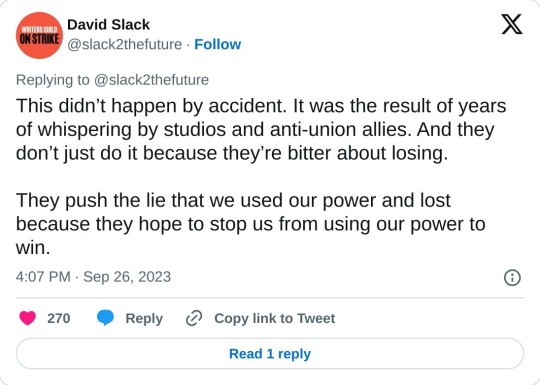
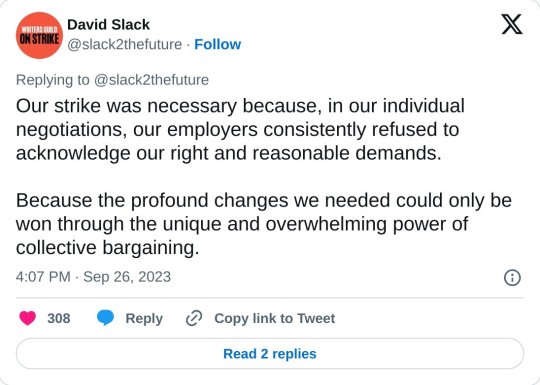
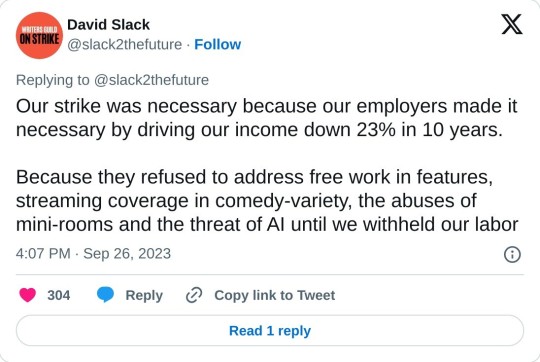
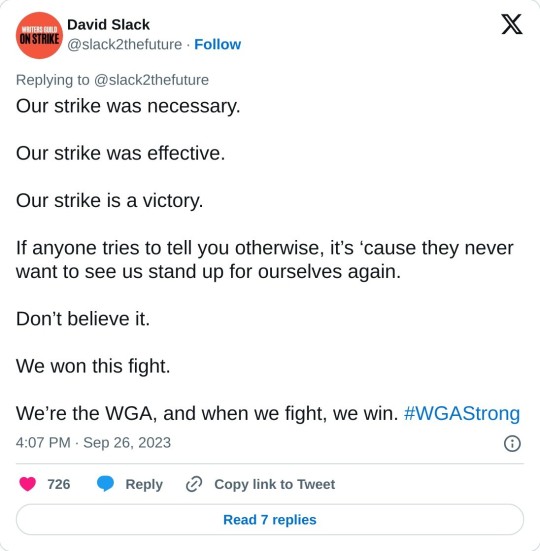
Twitter thread by David Slack @/slack2thefuture:
"As WGA leaders meet today to finalize our deal, we begin a new era for writers — and for labor in our industry. But we also begin to face the final and most insidious form of unionbusting propaganda: a years-long effort to sell the lie that our strike was not worth it.
Over the coming days, months, and years, the studios, streamers, and their surrogates will take every opportunity to undermine what we have won together. They will seize on the inevitable consessions and compromises made by our NegCom as proof that we “failed.”
They will urge us to overlook all that we won through hard work and unwavering solidarity. They will claim it wasn’t enough, that we should have gotten X instead of Y, that we lost more by striking than we gained in this new contract. And they will be wrong.
They will tell us that the strike was unnecessary, it was a waste of our time and our savings, that our agents or managers or lawyers could have gotten us everything we won through individual negotiations without anyone having to walk a picket line. Well… then why didn’t they?
As hard as it is to believe right now, these lies can work. They’ve worked before. During our 2017 strike authorization vote, it was shocking to discover how many members believed we lost the ‘07-08 strike, in which we went on strike for the internet — and won the internet.
This didn’t happen by accident. It was the result of years of whispering by studios and anti-union allies. And they don’t just do it because they’re bitter about losing. They push the lie that we used our power and lost because they hope to stop us from using our power to win.
Our strike was necessary because, in our individual negotiations, our employers consistently refused to acknowledge our right and reasonable demands. Because the profound changes we needed could only be won through the unique and overwhelming power of collective bargaining.
Our strike was necessary because our employers made it necessary by driving our income down 23% in 10 years. Because they refused to address free work in features, streaming coverage in comedy-variety, the abuses of mini-rooms and the threat of AI until we withheld our labor
Our strike was necessary. Our strike was effective. Our strike is a victory. If anyone tries to tell you otherwise, it’s ‘cause they never want to see us stand up for ourselves again. Don’t believe it. We won this fight. We’re the WGA, and when we fight, we win. #WGAStrong"
#wga strike#writers strike#union solidarity#i stand with the wga#sag-aftra strike#actors strike#wga strong#current events#david slack#long post#fans4wga
10K notes
·
View notes
Text
Famine, displacement and death...
The situation is getting worse day by day. There is no food, no milk, nothing ... only death. Not a second goes by without bombing, blasting, or killing innocent people and children.😭💔


As you can see in the picture, people are being killed every day for no reason, and corpses are flying in the air from the force of the bombing, and no one is moving a muscle.😭😔🙏
There is no food, no milk, no medicine, our lives are in danger...my family is in danger..😭


Help us and donate to buy food, milk and medicine for my family. We will die of hunger and bombing...🙏😭💔🍉
‼️You are our last hope‼️
#help palestine#free gaza#free palestine#freedom#palestinian#long live palestine#gaza genocide#gaza strip#gaza#gazaunderattack#palestine fundraiser#israel palestine conflict#palestine donation#palestine resources#palestine solidarity#justice for palestine#occupied palestine#palestine aid#pro palestine#send help#donations#artists on tumblr#writers on tumblr#i stand with palestine#quotes#all eyes on palestine#palestine genocide#palestine gfm#save palestine#palestine
794 notes
·
View notes
Text
writer's strike is amazing actually go girl get that fucking marvel show UNMADE get that fucking gay pirate show CANCELLED get these chronically online fandom bitches' obsessions on HOLD until the corporations learn to pay you your mf money that you deserve
20K notes
·
View notes
Text


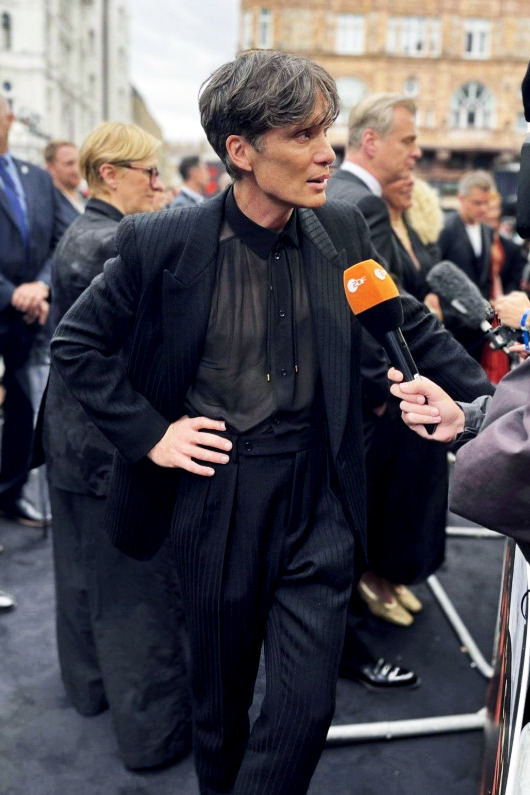


he came. he slayed in this little see-through black number. and then he walked out of his own premiere with the rest of the cast in support of the strike... cunty af
#i love a grey-haired 40-something twink who looks like a lesbian#cillian murphy#oppenheimer#wga strike#screen actors guild#writer’s guild of america#writers strike#sag strike#sag-aftra#wga solidarity#christopher nolan
11K notes
·
View notes
Text
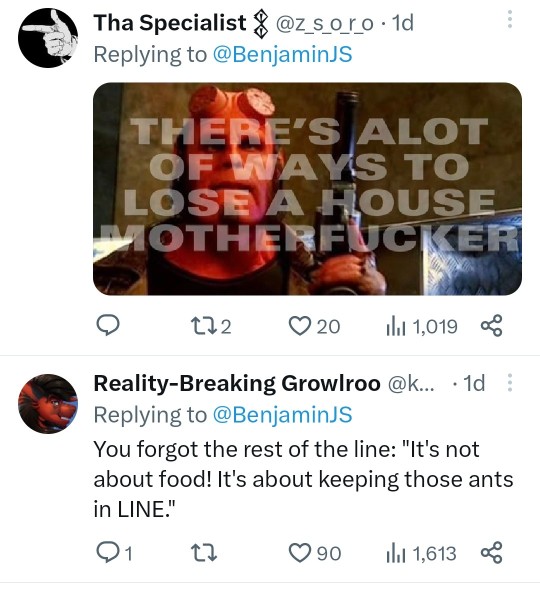


11K notes
·
View notes
Text

Reblog or repost
13K notes
·
View notes
Text
The news of the WGA deal is wonderful! However I just want to make a note of the news articles that will report on this:
It will be subtle, and you may not even notice it, but the language used in many articles will imply that SAG-AFTRA is still to blame for hollywood being shut down.
REMEMBER, THE ACTORS STRIKE IS STILL 100% THE FAULT OF THE STUDIOS AND THE AMPTP.
#wga#sag aftra#wga strike#sag aftra strike#union solidarity#stand with sag aftra#writers strike#actors strike
7K notes
·
View notes
Text
The way he SLAYYEDD
Ai could never give us “we put the greed in ingredients”
#netflix#wga strike#wga#writers guild strike#writers guild of america#wga solidarity#i stand with the wga#support the wga
7K notes
·
View notes
Text

LOOK AT MY MAN'S SKIN
Remember when I described his eyes in Canary's thrill, the first to kill as turning rosy pink? THIS IS WHAT I MEANT YIPPIE
This outfit will, for sure, make an apperance in the next few chapters
#lifeseries#trafficblr#life series theory#life series fanfiction#life series fanfic#solidaritygaming#solidarity#jimmy solidarity#canary curse#ao3 fanfic#ao3 fanfiction#ao3 writer#mcyt#mcyt fanfic
623 notes
·
View notes
Text
"The studios thought they could handle a strike. They might end up sparking a revolution"
by Mary McNamara
"If you want to start a revolution, tell your workers you’d rather see them lose their homes than offer them fair wages. Then lecture them about how their “unrealistic” demands are “disruptive” to the industry, not to mention disturbing your revels at Versailles, er, Sun Valley.
Honestly, watching the studios turn one strike into two makes you wonder whether any of their executives have ever seen a movie or watched a television show. Scenes of rich overlords sipping Champagne and acting irritated while the crowd howls for bread rarely end well for the Champagne sippers.
This spring, it sometimes seemed like the Hollywood studios represented by the Alliance of Motion Picture and Television Producers were actively itching for a writers’ strike. Speculations about why, exactly, ran the gamut: Perhaps it would save a little money in the short run and show the Writers Guild of America (perceived as cocky after its recent ability to force agents out of the packaging business) who’s boss.
More obviously, it might secure the least costly compromise on issues like residuals payments and transparency about viewership.
But the 20,000 members of the WGA are not the only people who, having had their lives and livelihoods upended by the streaming model, want fair pay and assurances about the use of artificial intelligence, among other sticking points. The 160,000 members of the Screen Actors Guild-American Federation of Television and Radio Artists share many of the writers’ concerns. And recent unforced errors by studio executives, named and anonymous, have suddenly transformed a fight the studios were spoiling for into a public relations war they cannot win.
Even as SAG-AFTRA representatives were seeing a majority of their demands rejected despite a nearly unanimous strike vote, a Deadline story quoted unnamed executives detailing a strategy to bleed striking writers until they come crawling back.
Days later, when an actors’ strike seemed imminent, Disney Chief Executive Bob Iger took time away from the Sun Valley Conference in Idaho not to offer compromise but to lecture. He told CNBC’s David Faber that the unions’ refusal to help out the studios by taking a lesser deal is “very disturbing to me.”
“There’s a level of expectation that they have that is just not realistic,” Iger said. “And they are adding to the set of the challenges that this business is already facing that is, quite frankly, very disruptive.”
If Iger thought his attempt to exec-splain the situation would make actors think twice about walking out, he was very much mistaken. Instead, he handed SAG-AFTRA President Fran Drescher the perfect opportunity for the kind of speech usually shouted atop the barricades.
“We are the victims here,” she said Thursday, marking the start of the actors’ strike. “We are being victimized by a very greedy entity. I am shocked by the way the people that we have been in business with are treating us. I cannot believe it, quite frankly: How far apart we are on so many things. How they plead poverty, that they’re losing money left and right, when giving hundreds of millions of dollars to their CEOs. It is disgusting. Shame on them. They stand on the wrong side of history at this very moment.”
Cue the cascading strings of “Les Mis,” bolstered by images of the most famous people on the planet walking out in solidarity: the cast of “Oppenheimer” leaving the film’s London premiere; the writers and cast of “The X-Files” reuniting on the picket line.
A few days later, Barry Diller, chairman and senior executive of IAC and Expedia Group and a former Hollywood studio chief, suggested that studio executives and top-earning actors take a 25% pay cut to bring a quick end to the strikes and help prevent “the collapse of the entire industry.”
When Diller is telling executives to take a pay cut to avoid destroying their industry, it is no longer a strike, or even two strikes. It is a last-ditch attempt to prevent le déluge.
Yes, during the 2007-08 writers’ strike, picketers yelled noncomplimentary things at executives as they entered their respective lots. (“What you earnin’, Chernin?” was popular at Fox, where Peter Chernin was chairman and chief executive.) But that was before social media made everything more immediate, incendiary and personal. (Even if they have never seen a movie or TV show, one would think that people heading up media companies would understand how media actually work.)
Even at the most heated moments of the last writers’ strike, executives like Chernin and Iger were seen as people who could be reasoned with — in part because most of the executives were running studios, not conglomerations, but mostly because the pay gap between executives and workers, in Hollywood and across the country, had not yet widened to the reprehensible chasm it has since.
Now, the massive eight- and nine-figure salaries of studio heads alongside photos of pitiably small residual checks are paraded across legacy and social media like historical illustrations of monarchs growing fat as their people starve. Proof that, no matter how loudly the studios claim otherwise, there is plenty of money to go around.
Topping that list is Warner Bros. Discovery Chief Executive Davd Zaslav. Having re-named HBO Max just Max and made cuts to the beloved Turner Classic Movies, among other unpopular moves, Zaslav has become a symbol of the cold-hearted, highly compensated executive that the writers and actors are railing against.
The ferocious criticism of individual executives’ salaries has placed Hollywood’s labor conflict at the center of the conversation about growing wealth disparities in the U.S., which stokes, if not causes, much of this country’s political divisions. It also strengthens the solidarity among the WGA and SAG-AFTRA and with other groups, from hotel workers to UPS employees, in the midst of disputes during what’s been called a “hot labor summer.”
Unfortunately, the heightened antagonism between studio executives and union members also appears to leave little room for the kind of one-on-one negotiation that helped end the 2007-08 writers’ strike. Iger’s provocative statement, and the backlash it provoked, would seem to eliminate him as a potential elder statesman who could work with both sides to help broker a deal.
Absent Diller and his “cut your damn salaries” plan, there are few Hollywood figures with the kind of experience, reputation and relationships to fill the vacuum.
At this point, the only real solution has been offered by actor Mark Ruffalo, who recently suggested that workers seize the means of production by getting back into the indie business, which is difficult to imagine and not much help for those working in television.
It’s the AMPTP that needs to heed Iger’s admonishment. At a time when the entertainment industry is going through so much disruption, two strikes is the last thing anyone needs, especially when the solution is so simple. If the studios don’t want a full-blown revolution on their hands, they’d be smart to give members of the WGA and SAG-AFTRA contracts they can live with."
#sag-aftra strike#sag strike#fans4wga#writers guild strike#actors guild strike#union solidarity#wga strong#i stand with the wga#wga strike#writers strike
7K notes
·
View notes
Text

Who said I wasn't stubborn?
#WGA Strike#Writers Strike#WGA#WGA Strong#SAG AFTRA#SAG AFTRA Strike#SAG-AFTRA Strong#Union Strong#Justice for Creatives#Fans in Solidarity#pay your actors#pay your writers#Good Omens#Good Omens 2#Renew Good Omens
4K notes
·
View notes
Text
2023 really feels like a big step up from the previous years, like yes the world is still burning but now it feels more like capitalism starting to burn instead of just innocent people
elon musks collosal fuckups and social decline
billionaires dying in an iron box built of hubris
the writer and actor strikes bringing hollywood to a standstill
I feel like there’s more I‘m forgetting, but I can’t help but feel a little optimistic y‘all
5K notes
·
View notes